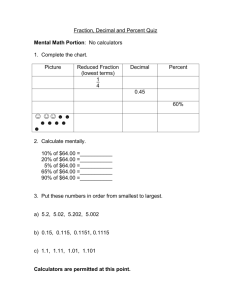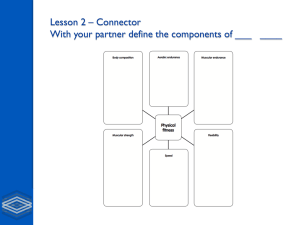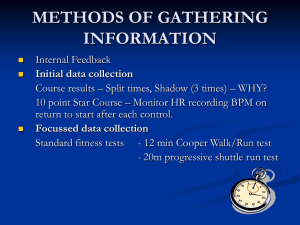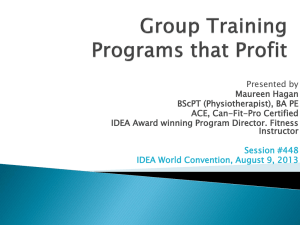PGR Conference
advertisement
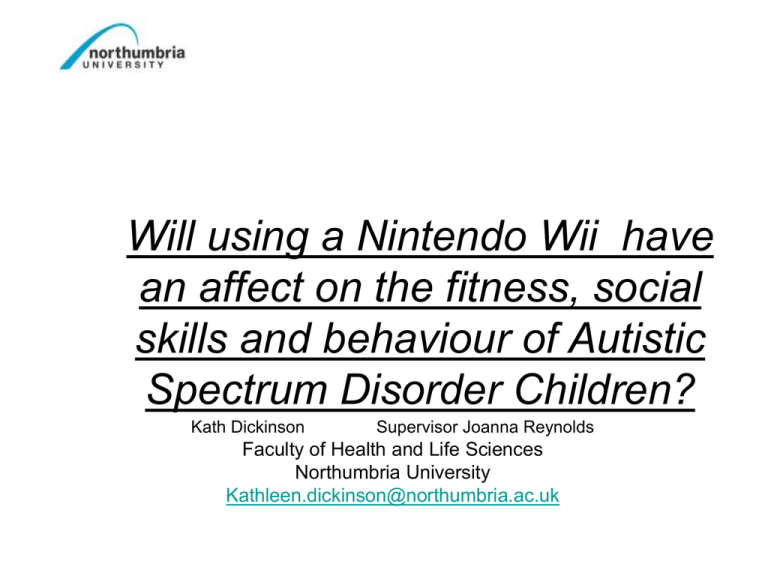
Will using a Nintendo Wii have an affect on the fitness, social skills and behaviour of Autistic Spectrum Disorder Children? Kath Dickinson Supervisor Joanna Reynolds Faculty of Health and Life Sciences Northumbria University Kathleen.dickinson@northumbria.ac.uk Background – Why? MA study Mainstream Asperger boys with a computer interest. In the UK research evidence suggests that children are becoming obese at an increased rate and at an earlier age than ever before. Every year the number of children diagnosed as being on the Autistic Spectrum Continuum continues to rise (now between 1 in 5 and 1 in 8). Triad of impairments. Social impairmentsimprovement of social interaction, mainstream activity. Communicationforced Learning stylesvisual, non human Behaviourresearch has shown that some physical traditional types of physical activity can reduce stereotyped behaviours and outbursts. (Kern, Koegel,Dunlap 1984) Aims and objectives To explore the fitness levels and social skills of Autistic children and investigate whether they can be altered through the use of a Nintendo Wii gaming machine. Objective (1) to investigate any changes in fitness levels. Objective (2) to investigate any changes in social interaction. Objective (3) to investigate any changes in crisis behaviour. Objective (4) to investigate any transference of social skills to other areas of life. Intervention Ran for 1 academic year. 100 children from state SEN schools all children have ASD, Language & Communication impairments, Severe to Moderate learning impairments and behavioural issues. Aged between 8 and 16 years (Total males 79 = 39 in intervention 40 in non intervention females 21= intervention 11 and 10 non intervention.). Used the Wii 3 to 5 times per week for 15 to 30 minutes. Completed pre and post intervention testing. Method Experimental mixed methods design. Quantitative data- collection of base line fitness information and end fitness levels. Qualitative data- used to collect information on behaviour changes, social changes and transference skills. Primary data collection Selected from the Eurofitness Testing Battery & FitnessGram (USA) (tests to be streamlined for full study) BMI Multi stage fitness test (Bleep test) PACER test (Progressive aerobic cardiovascular endurance run) 10x5m shuttle run standing long jump Sit and reach flexibility test Sit up test (30 seconds) Secondary Data collection Faces IV (parents) Parental Stress Index Sue Spence Social Skills test (staff) Staff observation and questionnaire. Video collection. Observation of social interaction (eye contact, social space, number of exchanges) Issues Getting the children to participate. Matching the groups. Using mixed methods. No information from the children. How to analyse the video evidence. No norms for SEN or ASD children. Results Preliminary results indicate that there are significant changes in the BMI and fitness levels of the children taking part in the intervention when compared to the control group in all aspects except flexibility. Results Staff have noted observable changes in social behaviour which included Friendships, ability to initiate a conversation, willingness to join in activities, approaching others with requests, engaging and disengaging eye contact. Findings Conclusion: Preliminary results suggest that benefits in fitness, participation and social skills may be gained from using the Nintendo Wii with a group of autistic children with ID.


